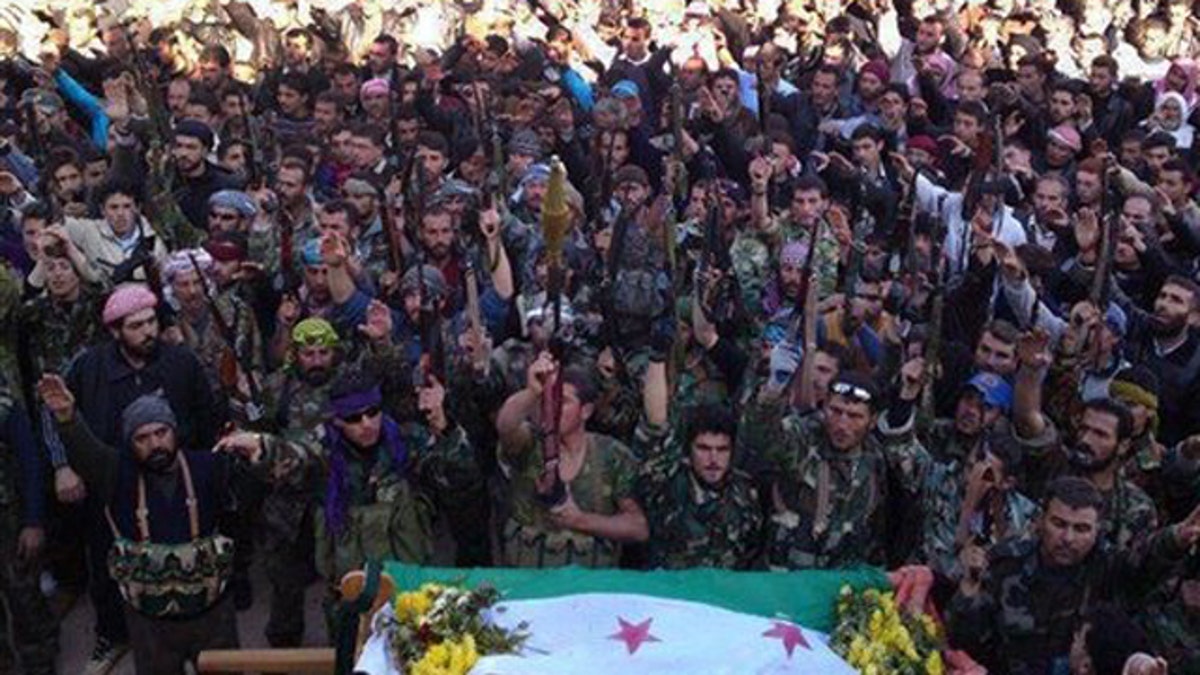
Feb. 2, 2012: In this image, provided by the Local Coordination Committees in Syria, Syrian rebels raise their weapons as they attend a funeral procession of their comrade, whose dead body, front, is seen wrapped by the Syrian revolution flag, in Edleb, north Syria. (AP)
DAMASCUS, Syria – The U.S. and its allies were considering giving military aid to the Syrian opposition battling the regime of President Bashar al Assad in an 11-month uprising that activists say has killed more than 6,000 people.
The Pentagon had drawn contingency plans that could include supplying the Free Syrian Army (FSA) with weapons and establishing a humanitarian corridor to deliver aid to civilians, The (London) Times reported Thursday, citing a U.S. official.
While U.S. officials said they were "scoping out" military options, any plans at the moment were purely "academic."
Several nations have already been aiding the rebels, with Saudi Arabia providing financial assistance and Qatar supplying them with 3,000 satellite phones. Qatar was also deliberating giving the FSA night-vision equipment and anti-tank missiles.
The FSA's logistical coordinator Sheikh Zuheir Abassi told The Times the rebels wanted the West to provide no-fly zones and a haven from which they could safely operate.
"If we were given these two, most of the army would desert and join us," Abassi said. "We are not asking the West to intervene but to give us weapons. We can do the rest." Some 40,000 soldiers have deserted the regular army to date, the opposition said.
The request for military aid was reiterated during a video conference call that was broadcast in Washington on Wednesday.
Speaking to Middle East experts and journalists at a national security think tank, rebels inside Syria said the U.S. in particular should harden its policies against Assad and find a way to shuttle guns, rocket launchers and other heavy weapons to rebels, AFP reported.
"The major point is logistical material support. We can do this ourselves; we're not asking for any troops," an FSA commander, who identified himself only as Mohammad, said.
"We want military support. We want supplies," he said. "We have the numbers on our side, we just don't have the weapons."
"We are facing a death machine that is one of the worst in the world," Mohammad said, adding that his poorly-armed rebels were using "light weapons to battle tanks."
However, a Syria expert warned against military intervention, saying the escalating crisis could become even more complicated, with the West backing the rebels and Russia and China standing behind Assad's regime.
"There is a risk it could become a proxy conflict. It is already headed in that direction," Andrew Tabler, from the Washington Institute for Near East Policy, told The Times.
"I think you will see now different countries in the region betting on the Free Syrian Army. Already weapons have been coming in from Lebanon. You will now see more coming in from Jordan, from Turkey, from Iraq or from Russia. Everyone will start to operate in this environment."
The Obama administration said Tuesday that the U.S. was not considering arming the Syrian opposition, but was exploring providing humanitarian aid to the Syrian people, The Wall Street Journal reported.
"We are exploring the possibility of providing humanitarian aid to Syrians, and we are working with our partners again to ratchet up the pressure, ratchet up the isolation on Assad and his regime," White House Press Secretary Jay Carney said.
"We're seeing a lot of indications of a lack of control over the country by the regime, of interest by senior officials within the military and the government in separating themselves from the regime. So we believe that that pressure is having an impact."
Asked if the U.S. was considering arming the opposition, Carney said, "We are not considering that step right now."




